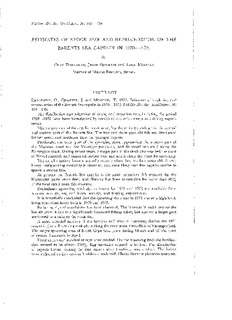Estimates of stock size and reproduction of the Barents Sea capelin in 1970-1972
Abstract
DRAGESUND, O., GJØSÆTER, J. and MONSTAD, T. 1973. Estimates of stock size and
reproduction of the Barents Sea capelin in 1970-1972. FiskDir. Skr. Ser. HavUnders.,
16: 105-139.
The distribution and migration of young and maturing capelin during the period
1969-1972 have been investigated by combined acoustic surveys and fishing experiments.
The nursery area of the capelin is extensive, but the main grounds are in the central
and eastern part of the Barents Sea. The two and three year old fish are distributed
farther north and northeast than the younger capelin.
Previously, the main part of the spawning stock approached the western part of
the Murman coast and the Varanger peninsula, and dispersed westward along the
Norwegian coast. During recent years, a major part of the stock also reached the coast
of West-Finnmark and migrated farther west and south along the coast for spawning.
The capelin mainly become sexually mature when they are four years old. A very
heavy postspawning mortality is observed, and most likely very few capelin survive to
spawn a second time.
At present the Barents Sea capelin is the most important fish resource for the
Norwegian purse seine fleet, and Norway has been responsible for more than 90%
of the total catch from this resource.
Preliminary spawning stock size estimates for 1971 and 1972 are available from
acoustic surveys, egg and larval surveys, and tagging experiments.
It is tentatively concluded that the spawning stock size in 1971 was at a high level,
being somewhat lower both in 1970 and 1972.
So far no sign of overfishing has been observed. The increase in catch during the
last six years is due to a significantly increased fishing effort, but also for a larger part attributed to a raise in the stock size.
A more detailed analysis of the location and time of spawning during the 1971
season is given. Spawning took place along the coast from Vesterålen to Varangerfjord.
The major spawning west of North Cape took place during March and off the coast
of eastern Finnmark in April.
Fertilization and survival of eggs were studied. On the spawning beds the fertilization seemed to be almost 100%.
Egg mortality seemed to be low. The distribution of capelin larvae, during the first month after hatching, was studied.
The larvae were collected on five surveys in oblique hauls with Clarke Bumpus plankton samplers.
Publisher
[Fiskeridirektoratets havforskningsinstitutt]Series
Fiskeridirektoratets skrifter, Serie Havundersøkelservol 16 no 4
